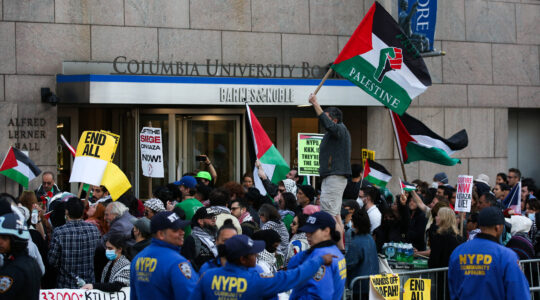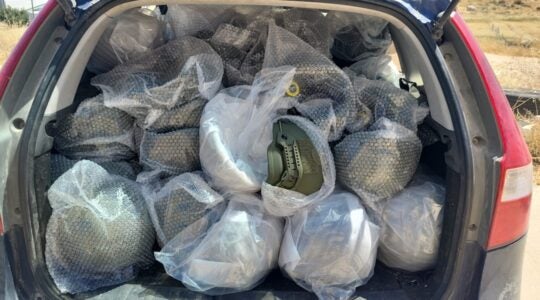WASHINGTON (JTA) — It’s not nearly enough.
That’s the consensus among American Jewish groups over the changes made last week to the draft resolution for next month’s Durban Review Conference in Geneva, and it appears the Obama administration agrees.
While explicit negative references to Israel have been eliminated, U.S. Jewish leaders say the text’s reaffirmation of the declaration from the virulently anti-Israel 2001 World Conference against Racism, Racial Discrimination, Xenophobia and Related Intolerance in Durban, South Africa, makes the new document unacceptable.
“It’s a backdoor way of including” derogatory language about Israel, said Malcolm Hoenlein, executive vice chairman of the Conference of Presidents of Major American Jewish Organizations.
“We have to be careful not to be fooled,” said Anti-Defamation League national director Abraham Foxman, calling the change an effort at “camouflage” to soften the opposition.
“It’s a tactic to try to hold those who haven’t pulled out,” he added.
The changes to the original draft document were made last week after Italy announced it would not participate in the so-called Durban II conference in Switzerland — and it appeared that much of the rest of the European Union would follow suit.
That followed the U.S. decision late last month to pull out of the April 20-24 conference — Israel and Canada had announced boycotts earlier — unless certain conditions were met. They included the elimination of language singling out Israel, including its characterizations as an “apartheid state”; the removal of passages calling for restrictions on the “defamation of religion,” which critics say would threaten free speech; and eliminating a reaffirmation of the document from the 2001 conference in Durban.
The Obama administration has indicated that the new draft resolution is unacceptable.
“There’s certainly been no decision for us to rejoin the negotiating process on the basis of this document,” the acting assistant secretary of state for international organization affairs, James Warlick, told the Jerusalem Post on March 20.
Warlick said the State Department was continuing to review the draft, but “it remains clear that we will come back only when we are confident that Durban is going to address real issues of racism.”
The new draft does appear to meet some of the Obama administration’s conditions, although some said its references to the media’s “incitement to hatred” appears to be a coded reference to “defamation of religion.”
The problem for the Americans, Canadians, Jewish groups and some European countries is that the new text reaffirms the Durban 2001 resolution in its very first sentence and adds a dozen more references throughout the 17-page document.
The Durban 2001 document states, “We are concerned about the plight of the Palestinian people under foreign occupation,” and recognizes the right of all states in the region, including Israel, to security — language that was toned down from earlier drafts of the document, which explicitly referred to “racial discrimination” against Palestinians.
American Jewish groups say the problem is the context for that language. By mentioning the Palestinian issue within a document for a conference ostensibly about racism, it incorrectly marks Israel’s treatment of the Palestinians as an issue of race, they say.
“It has improved,” Aaron Jacob, associate director of international affairs for the American Jewish Committee, said of the draft document for Geneva.
Jacob noted that America’s decision to send a delegation to conference preparatory talks last month before pulling out may have spurred members to make the changes to the draft in the hope that the United States would participate in the Geneva conference.
“But it’s still a deeply flawed document and we continue to encourage governments not to go,” he said.
B’nai B’rith International executive vice president Dan Mariaschin refused to recognize changes in the draft document as improvements, saying the new document employs a familiar “diplomatic device” often used at the United Nations in which only a portion of the offending language is eliminated and everyone declares victory.
“This isn’t a victory,” Mariaschin said. “This does not solve the problem we are dealing with.”
Late last week, the delegation from the Netherlands offered an alternative conference declaration. Its two-page document does not reaffirm the 2001 resolution and makes other improvements, such as stressing the importance of freedom of expression.
Jewish leaders said it was extremely unlikely such a document would be adopted by the full conference.
“At this point it will have to be close to an epiphany,” said Foxman, adding that he doesn’t see countries such as Libya, the conference chair, and Iran, a vice chair, “operating in a good-faith effort.”
Even if a draft document did meet with Jewish approval before the conference opening, some Jewish leaders said assurances would be necessary that the conference would not descend into an anti-Israel hate fest once everyone was in Geneva.
Jewish groups say that e
ven with the most positive draft document possible, they would still brace for attempts to amend the declaration, as well as the sort of anti-Israel and anti-Semitic demonstrations that took place outside the 2001 meeting in Durban.
“We wholeheartedly support a global campaign against racism and discrimination,” Jacob said. “It has been one of our major principles. It’s really sad that this noble cause has been hijacked.”





